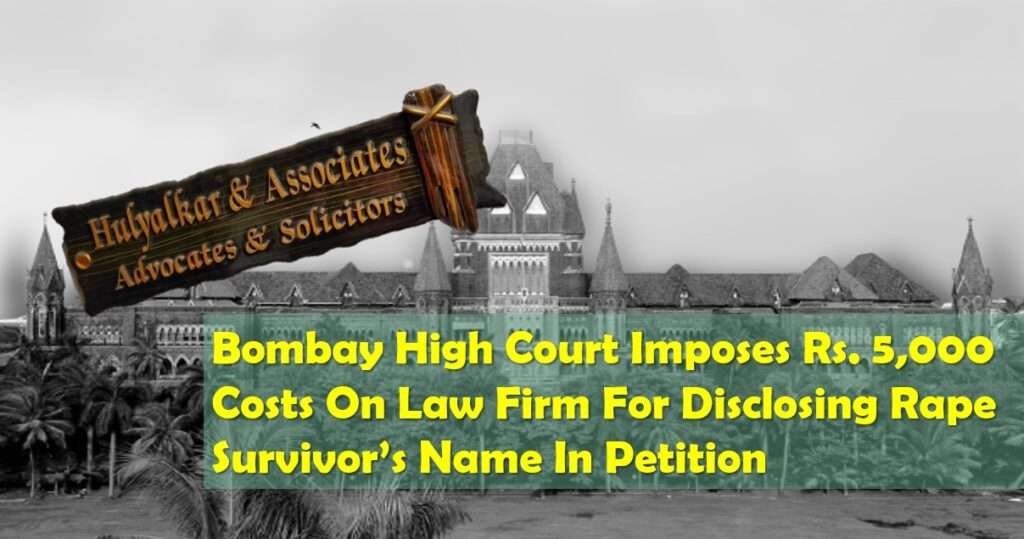
The Bombay high court foisted a compensation of a cost of Rs. 5,000 on the firm as they failed to comply by repeatedly said note given by the court. The law firm was sanctioned over disclosure of the name of the rape victim in their petition. The lawyers were ordered to amend the plea and to conceal the victim’s name, if appeared in the plea.
As per Section 228A of the IPC, “Whoever prints or publishes the name or any matter which may make known the identity of any person (victim) against whom an offence under Section 376 (rape) is alleged or found to have been committed shall be punished with imprisonment of either description for a term which may extend to two years and shall also be liable to fine.”
This section 228A was introduced into the Indian Penal Code by the criminal law amendment act, 1983, by the Deergh uppal, which allows the disclosing of the identification of victims of such offenses a punishable act, in order to interpret the demand and succumb to the social stigma of victimization after crime.
While hearing an accused’s plea, a division bench of Justice Revati Mohite-Dere and Justice Prithviraj K Chavan, made the observation on Thursday, in which, they order to quash the FIR registered against him by the Pune police under Sections 376 (rape), 406 (criminal breach of trust), and 420 (cheating) of the Indian Penal Code (IPC).
The law firm Huyalkar & Associates instructed advocate Zaid Anwar Qureshi, a petitioner’s representative, to make the asked modification, in the plea, which includes the title of the same and which was further supported by the court.
“Hence, the law firm, who drafted the petition, to deposit costs of Rs.5,000/- with the Kirtikar Law Library (situated inside HC) within two weeks,” the bench ordered.
The bench enunciates and commanded petitioner to issue notices to the respondents including the state government, the Pune police and the complainant seeking their response during the next hearing and also directed to give a spare copy of the amended plea to the high court registry within two weeks.
A three-judge Bench of Supreme Court comprising of Justice Ashok Bhushan, Vineet Saran and M.R. Shah took strong objections to a Sessions Court Judgment where the names of rape victim are mentioned. The Bench held that all the subordinate courts should be careful not to reveal the identity of a rape victim in any proceedings.
“We take exception to the judgment of the Sessions Judge where the name of victim is mentioned. It is well-established that in cases like the present one, the name of the victim is not to be mentioned in any proceeding. We are of the view that all subordinate courts should be careful in future while dealing with such cases,” a Bench led by Justice Ashok Bhushan said in the recent order.
the apex court, in the State of Karnataka versus Puttaraja case, had said it would be ‘appropriate’ if courts do not name the victim in its records.
the apex court, in the State of Karnataka versus Puttaraja case, had said it would be ‘appropriate’ if courts do not name the victim in its records.
“True it is, the restriction does not relate to printing or publication of judgment by High Court or Supreme Court. But keeping in view the social object of preventing social victimisation or ostracism of the victim of a sexual offence for which Section 228-A has been enacted, it would be appropriate that in the judgments, be it of this court, High Court or lower court, the name of the victim should not be indicated. We have chosen to describe her as ‘victim’ in the judgment,” the apex court said in Puttaraja.
Conclusion:
It is necessary that a victim’s privacy should be respected, and therefore, the supreme court has asked to take care to not reveal the identity and details of a victim. This could aid victim to live a better and peaceful life. The media may use the information and details in a wrong manner and starts to frame the victim’s family and the victim, further causes hassle and inconvenience to them. We should stand in support of them and rather practicing and enjoying more of our fundamental right i.e., right to speech and expression, one should perform in a good way and in the benefit and favor of the society because right to privacy is also vital and recognized fundamental rights of an individual and therefore, one should not cross our threshold.
BY: AYUSHI BHUSHAN, 1ST YEAR, BA.LLB(INTEGRATED), BANASTHALI UNIVERSITY, RAJASTHAN




0 Comments